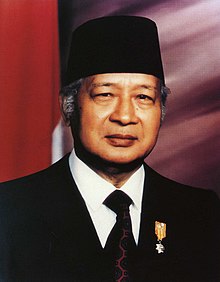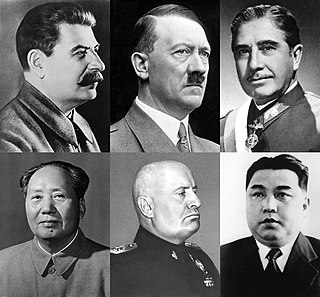
A dictator is a political leader who possesses absolute power. A dictatorship is a state ruled by one dictator or by a small clique. The word originated as the title of a Roman dictator elected by the Roman Senate to rule the republic in times of emergency.

A dictatorship is an autocratic form of government which is characterized by a leader, or a group of leaders, who hold governmental powers with few to no limitations. Politics in a dictatorship are controlled by a dictator, and they are facilitated through an inner circle of elites that includes advisers, generals, and other high-ranking officials. The dictator maintains control by influencing and appeasing the inner circle and repressing any opposition, which may include rival political parties, armed resistance, or disloyal members of the dictator's inner circle. Dictatorships can be formed by a military coup that overthrows the previous government through force or they can be formed by a self-coup in which elected leaders make their rule permanent. Dictatorships are authoritarian or totalitarian, and they can be classified as military dictatorships, one-party dictatorships, personalist dictatorships, or absolute monarchies.
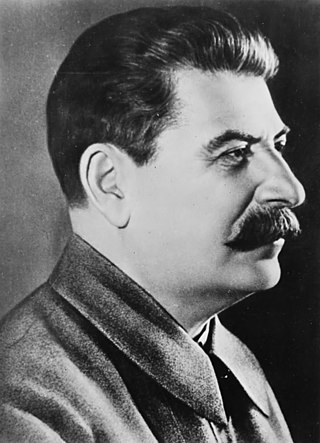
Totalitarianism is a political system and a form of government that prohibits opposition political parties, disregards and outlaws the political claims of individual and group opposition to the state, and controls the public sphere and the private sphere of society. In the field of political science, totalitarianism is the extreme form of authoritarianism, wherein all socio-political power is held by a dictator, who also controls the national politics and the peoples of the nation with continual propaganda campaigns that are broadcast by state-controlled and by friendly private mass communications media.
A cult of personality, or a cult of the leader, is the result of an effort which is made to create an idealized and heroic image of a glorious leader, often through unquestioning flattery and praise. Historically, it has developed through techniques of mass media, propaganda, spectacle, the arts, patriotism, and government-organized demonstrations and rallies. A cult of personality is similar to apotheosis, except that it is established by modern social engineering techniques, usually by the state or the party in one-party states and dominant-party states. Cults of personality often accompany the leaders of totalitarian or authoritarian governments. They can also be seen in some monarchies, theocracies, failed democracies and even in liberal democracies.
Führer is a German word meaning "leader" or "guide". As a political title, it is strongly associated with Adolf Hitler, the dictator of Nazi Germany from 1933 to 1945. Hitler officially styled himself der Führer und Reichskanzler after the death of President Paul von Hindenburg in 1934 and the subsequent merging of the offices of Reichspräsident and Reichskanzler.

Duce is an Italian title, derived from the Latin word dux 'leader', and a cognate of duke. National Fascist Party leader Benito Mussolini was identified by Fascists as Il Duce of the movement since the birth of the Fasci Italiani di Combattimento in 1919. In 1925 it became a reference to the dictatorial position of Sua Eccellenza Benito Mussolini, Capo del Governo, Duce del Fascismo e Fondatore dell'Impero. Mussolini held this title together with that of President of the Council of Ministers: this was the constitutional position which entitled him to rule Italy on behalf of the King of Italy. Founder of the Empire was added for the exclusive use by Mussolini in recognition of his founding of an official legal entity of the Italian Empire on behalf of the King in 1936 following Italy's victory in the Second Italo-Ethiopian War. The position was held by Mussolini until 1943, when he was removed from office by the King and the position of "Duce" was dismantled, while Marshal Pietro Badoglio, 1st Duke of Addis Abeba was appointed Presidente del Consiglio.
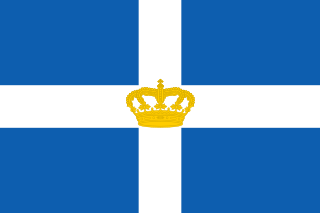
The 4th of August Regime, commonly also known as the Metaxas regime, was an authoritarian regime under the leadership of General Ioannis Metaxas that ruled the Kingdom of Greece from 1936 to 1941.

Poglavnik is a Serbo-Croatian word meaning "leader" or "guide".

Conducător was the title used officially by Romanian dictator Ion Antonescu during World War II, also occasionally used in official discourse to refer to Carol II and Nicolae Ceaușescu.
A supreme leader or supreme ruler typically refers to the person among a number of leaders of a state, organization or other such group who has been given or is able to exercise the most – or complete – authority over it. In a religion, this role is usually satisfied by a person deemed to be the representative or manifestation of a deity or God on Earth. In politics, a supreme leader usually rules over an authoritarian or totalitarian government and has a cult of personality associated with them. Historic examples are Adolf Hitler of Nazi Germany, Francisco Franco of Francoist Spain, Benito Mussolini of Fascist Italy and Joseph Stalin of the Soviet Union.

The Axis leaders of World War II were important political and military figures during World War II. The Axis was established with the signing of the Tripartite Pact in 1940 and pursued a strongly militarist and nationalist ideology; with a policy of anti-communism. During the early phase of the war, puppet governments were established in their occupied nations. When the war ended, many of them faced trial for war crimes. The chief leaders were Adolf Hitler of Nazi Germany, Benito Mussolini of Fascist Italy, and Hirohito of Imperial Japan. Unlike what happened with the Allies, there was never a joint meeting of the main Axis heads of government, although Mussolini and Hitler met on a regular basis.

The 1944 Romanian coup d'état, better known in Romanian historiography as the Act of 23 August, was a coup d'état led by King Michael I of Romania during World War II on 23 August 1944. With the support of several political parties, the king removed the government of Ion Antonescu, which had aligned Romania with Nazi Germany, after the Axis front in northeastern Romania collapsed in the face of a successful Soviet offensive. The Romanian Army declared a unilateral ceasefire with the Soviet Red Army on the Moldavian front, an event viewed as decisive in the Allied advances against the Axis powers in the European theatre of World War II. The coup was supported by the Romanian Communist Party, the Social Democratic Party, the National Liberal Party, and the National Peasants' Party who had coalesced into the National Democratic Bloc in June 1944.

The government of Nazi Germany was a totalitarian dictatorship governed by Adolf Hitler and the Nazi Party according to the Führerprinzip. Nazi Germany was established in January 1933 with the appointment of Adolf Hitler as Chancellor of Germany, followed by suspension of basic rights with the Reichstag Fire Decree and the Enabling Act which gave Hitler's regime the power to pass and enforce laws without the involvement of the Reichstag or German president, and de facto ended with Germany's surrender in World War II on 8 May 1945 and de jure ended with the Berlin Declaration on 5 June 1945.
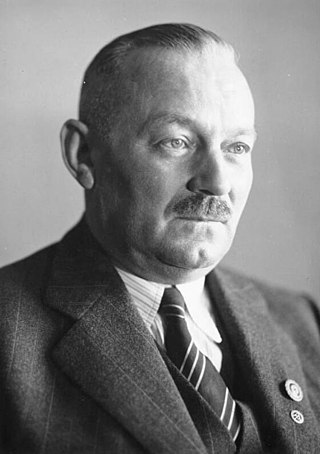
Manfred Freiherr von Killinger was a German naval officer, Freikorps leader, military writer and Nazi politician. A veteran of World War I and member of the Marinebrigade Ehrhardt during the German Revolution, he took part in the military intervention against the Bavarian Soviet Republic. After the Freikorps was disbanded, the antisemitic Killinger was active in the Germanenorden and Organisation Consul, masterminding the murder of Matthias Erzberger. He was subsequently a Nazi Party representative in the Reichstag and a leader of the Sturmabteilung, before serving as Saxony's Minister-President and playing a part in implementing Nazi policies at a local level.
Authoritarianism is a political system characterized by the rejection of democracy, and political plurality. It involves the use of strong central power to preserve the political status quo, and reductions in the rule of law, separation of powers, and democratic voting. Political scientists have created many typologies describing variations of authoritarian forms of government. Authoritarian regimes may be either autocratic or oligarchic and may be based upon the rule of a party or the military. States that have a blurred boundary between democracy and authoritarianism have some times been characterized as "hybrid democracies", "hybrid regimes" or "competitive authoritarian" states.

Some historians and other authors have carried out comparisons of Nazism and Stalinism. They have considered the similarities and differences between the two ideologies and political systems, the relationship between the two regimes, and why both came to prominence simultaneously. During the 20th century, the comparison of Nazism and Stalinism was made on totalitarianism, ideology, and personality cult. Both regimes were seen in contrast to the liberal democratic Western world, emphasising the similarities between the two.
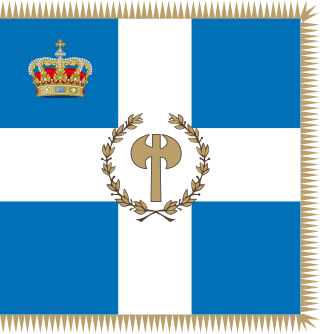
Metaxism is a Greek authoritarian nationalist ideology associated with Ioannis Metaxas. It called for the regeneration of the Greek nation and the establishment of a modern, culturally homogenous Greece. Metaxism disparaged liberalism, and held individual interests to be subordinate to those of the nation, seeking to mobilize the Greek people as a disciplined mass in service to the creation of a "new Greece."
Authoritarian conservatism is a political ideology that seeks to uphold order, tradition and hierarchy, often with forcible suppression of radical and revolutionary enemies such as communists, Nazis, and anarchists. Authoritarian conservative movements and regimes have included Chiangism in China, Metaxism in Greece, and Francoism in Spain.


